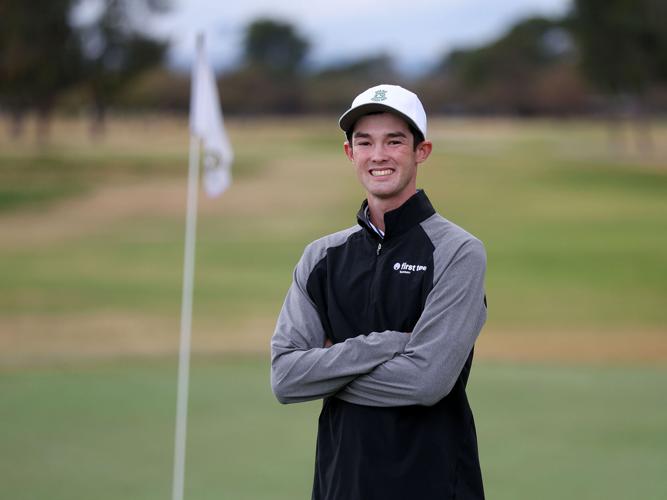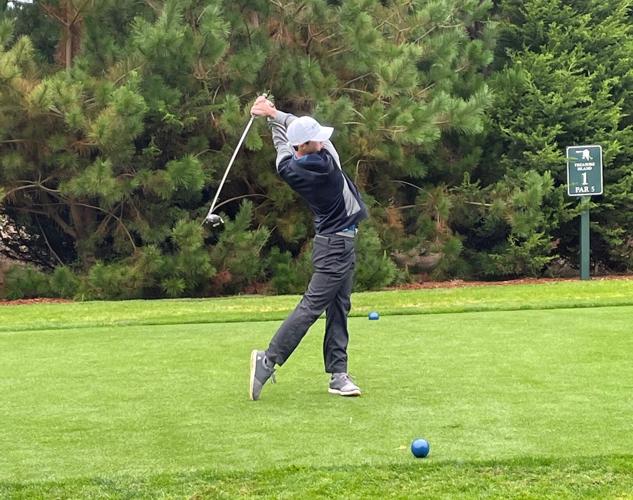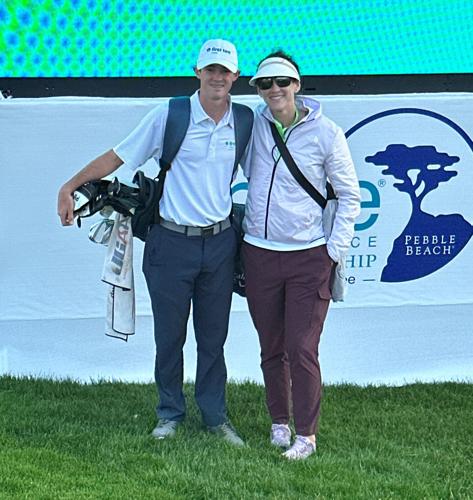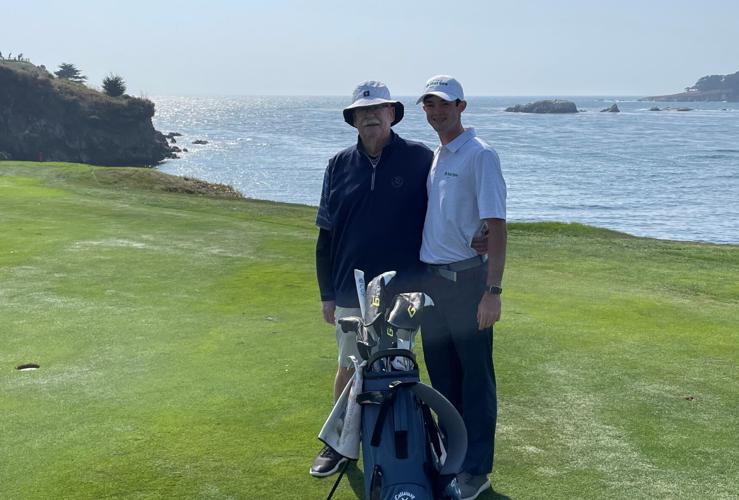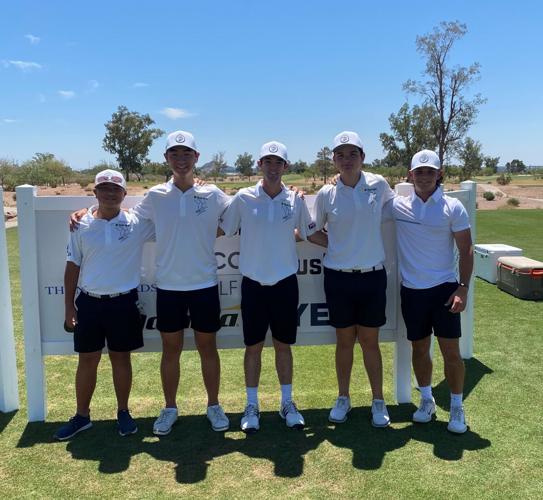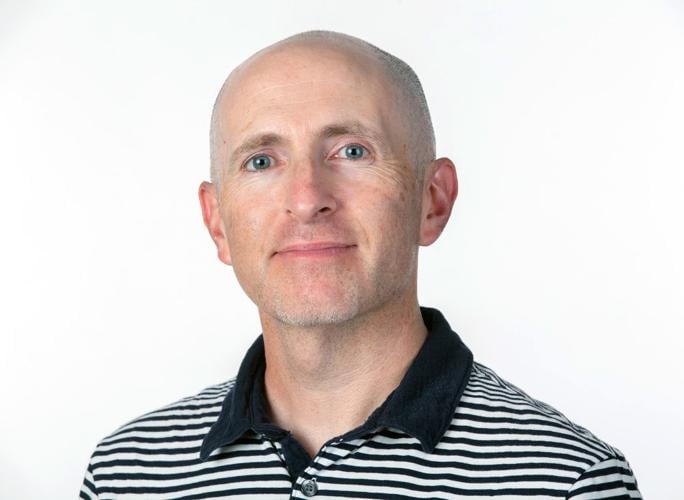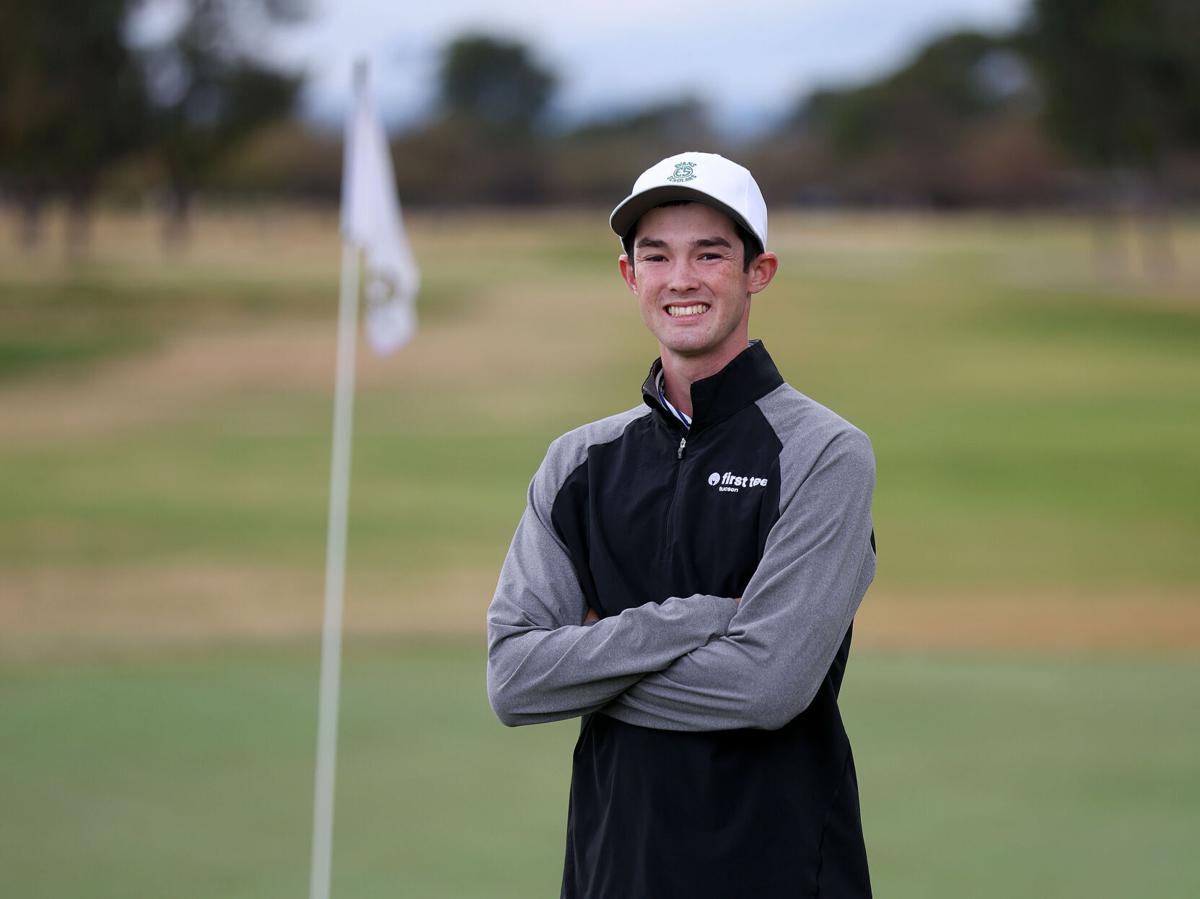Dear Evans Scholarship Selection Committee:
I am Judy McDermott, the executive director of First Tee — Tucson. I am honored to write this letter of recommendation for James Labukas. James has been an actively engaged First Tee — Tucson member for over 10 years. James is the most requested junior caddie at Tucson Country Club, representing our chapter since the inception of the caddie program. Sending this deserving, superb human and affable teen caddie to college as an Evans Scholar would be a decision the Evans Scholars Foundation will not regret.
Judy McDermott needed a fill-in for a PGA Jr. League match. She reached out to James Labukas, who was supposed to practice that afternoon with the golf team at The Gregory School.
“But it was at La Paloma,” Labukas said. “So how could I say no to that?”
Labukas never says no. But the then-16-year-old felt out of place when he realized the rest of the players were several years his junior. Then he drove the green on the first hole, which was supposed to be a par-5. The kids on the other team were freaking out.

Michael Lev is a senior writer/columnist for the Arizona Daily Star, Tucson.com and The Wildcaster.
“I felt so bad,” Labukas said.
Being the good Samaritan and sport that he is, Labukas didn’t spend the rest of the round dunking on his fellow golfers. He helped them find wayward shots and read curving putts.
The father of one of the participants couldn’t get over how well Labukas handled what could have been an uncomfortable situation. Dr. Kyle Rabe, an orthodontist, decided right then and there to give Labukas a set of braces, free of charge.
“I didn’t know who he was. But he was the most supportive kid ever,” Rabe said. “He was cheering ... the opposing team. It was crazy to watch. ‘Try this, try that, great shot’ — even if it wasn’t a great shot.”
After the match — which the First Tee team had to forfeit because it had an overaged player — Rabe approached Labukas to thank him.
“I was just so impressed with his character,” Rabe said. “He is so respectful. He’s just like a 10 out of 10.”
It wasn’t the first time Labukas left a lasting impression on someone he just met. McDermott has worked with area youth for decades. She never has encountered someone quite like James Labukas.

James Labukas, representing the First Tee — Tucson, hits a tee shot at Spyglass Hill Golf Course in Pebble Beach, California, during the PGA Tour Champions PURE Insurance Championship in September 2023.
“He's always a kid that has a twinkle in his eye,” McDermott said. “He's just a really special kid.”
Late last year, Labukas accomplished something that hadn’t been done by a Tucsonan in over 40 years: He earned an Evans Scholarship.
Administered by the Western Golf Association, the Evans Scholarship is a full tuition and housing college scholarship for high-achieving caddies with limited financial means. The scholarship is valued at more than $125,000 over four years.
Labukas, who graduated from The Gregory School last month, will be attending Northwestern University in the fall.
“I’m so tremendously proud of him, and he deserves every bit of it,” said Labukas’ mother, Courtney Whitley. “He’s put in the time, the effort, the work. It will change his life forever. It’s changed all of our lives.”
• • •

James Labukas, a graduate of The Gregory School, poses by the 18th green at Tucson Country Club. Labukas has caddied for years at TCC, helping him earn an Evans Scholarship to attend Northwestern University.
I was pleased to be involved with Steven Pearl and Tucson Country Club in the beginning stages of the caddie program. James was at the top of our list of kids we chose to attend the first caddie orientation. We knew James needed this opportunity for financial reasons, but we also knew he would blossom surrounded by the Tucson Country Club members, and he has. I am confident that every club member who has had James as a caddie would also write a letter of recommendation for James to become an Evans Scholar.
I met James Labukas a few months ago at Tucson Country Club. I could tell it wasn’t his first interview.
Wearing a white, Evans Scholar ballcap, a black and gray, First Tee three-quarter-zip pullover and khakis, Labukas was polite and professional. At one point, he didn’t like an answer he gave — “That came out wrong” — and offered an alternative.
At 17 years old (18 now), Labukas clearly understood the value of a proper introduction and a firm handshake. He began to learn those skills when he joined the First Tee program at around 9 years old. Labukas’ grandfather, Skip Whitley, an attorney and member of the Tucson Conquistadores, had introduced James to golf when he was 7.

James Labukas, center, poses with his First Tee El Rio teammates at the PING Junior Interclub Championship this spring at Papago Golf Club in Phoenix. Also pictured, from left to right: Kallum DeGuia, Oliver DeGuia, Valentin Ortiz and Joey Bernier.
“The First Tee is more than just the game of golf,” Labukas said. “It's like opening your eyes to opportunities.”
The opportunity to become a caddie and earn a scholarship wasn’t on Labukas’ radar back then. Steven Pearl, a Western Golf Association director, decided to launch a caddie program at TCC when he was the club’s president three years ago. Despite its golf-friendly climate, Tucson isn’t as conducive to caddying as you might think.
“This program started in the Midwest,” Pearl said. “And in the Midwest, this is a summer job for kids.”
Summer is the least appealing time to play golf in Southern Arizona. One of the requirements for the Evans Scholarship program is caddying 100 rounds, commonly known as “loops.” To fulfill that requirement, Labukas had to get creative. He’d work double shifts on weekends. He’d caddie during Christmas and Rodeo breaks. He went to White Mountain Country Club last summer to caddie in pleasant Pinetop.
Labukas is a skilled and talented golfer — he just helped First Tee El Rio win the PING Junior Interclub state championship — but he came to learn that caddying might provide a clearer path to college. So the kid who never says no had to say no to himself when it came to practicing and playing as much as his peers.

James Labukas, representing the First Tee — Tucson, reacts to a shot while playing in the PGA Tour Champions PURE Insurance Championship in September 2023 in Pebble Beach, California.
But Labukas had so much to gain from caddying. He could take mental reps while watching others play. He could learn a lot about people — their personalities and career paths. He could learn patience. If he did a good job, he could make more lasting impressions.
Labukas did a good job. Great even. He quickly ascended to “A” status at Tucson Country Club.
“From the get-go, he’d show up an hour early for a loop,” said Steven Grove, the director of golf at TCC. “His first question was, ‘What can I do to help out?’ ... That's not something you hear a lot about 16-, 17-, 18-year-olds.”
A “strong caddie record” is just one of the four requirements to apply for an Evans Scholarship. The others are “excellent academics,” “demonstrated financial need” and “outstanding character.”
Labukas qualified on all fronts. But he still had to go through the application and interview process. Only about a third of the applicants get the scholarship.
Thanks to Pearl’s connections to the WGA, Labukas’ family and supporters were able to watch his final interview last December via Zoom. He aced it. He found out he’d earned an Evans Scholarship later that day.
“It was pretty amazing,” McDermott said. “Lots of tears.”
Labukas had put in the work, on the course and in the classroom. His comportment was beyond reproach. Knowing the potential rewards, he devoted himself to caddying as he once did playing.
“James is definitely motivated,” his mother said. “When he wants something, he goes after it.
“When I couldn’t take him (to play), he’d grab his bag, pack a lunch and get on the bus at 5 in the morning ... and he wouldn’t come back till it was dark.”
In that way, Courtney Whitley said, her eldest child reminds her of herself.
“I’ve always been driven,” she said. “But there was a point in my life I was driven in the wrong direction.”
• • •
As you know from his application, James experienced intense, difficult times in his family and home life when he was younger due to his single mother’s substance abuse and serving time in jail. This kid persevered through challenging years that none of us would wish on anyone, especially a child. James grew up fast, helping to care for and nurture his younger brother, Nicholas. James could have taken a different path in life. James had to dig deep when things were tough. He learned from achievements and setbacks. Thankfully, the rough times are behind him. His mother, Courtney, is a phenomenal success story and a role model for James today.

First Tee — Tucson golfer James Labukas, left, poses with his mother, Courtney Whitley, at the PGA Tour Champions PURE Insurance Championship in September 2023 in Pebble Beach, California.
James Labukas recently gave a speech at Silverleaf, a ritzy private club in North Scottsdale. On the drive up, he worked on physics homework. At the club, he worked the room.
“He was chatting it up with everybody, making the rounds at the cocktail party before the program started,” McDermott said. “And then after the program, he was just a rock star. ... We couldn't get him out of there.”
How does a high school student from Tucson connect with a room full of millionaires and billionaires? By being himself. By being honest.
In his speech, Labukas talked about his parents getting divorced when he was 3 years old. He talked about his mom.
“She struggled heavily with addiction,” he told the room, “and ended up in terrible places.”
Courtney Whitley’s struggles — and recovery — aren’t what this story is about. But they are undeniably integral to the story — and further reason to appreciate what James Labukas has accomplished.
Whitley worked as an emergency medical technician for 10 years and has been a single parent for much of her adult life; James has a younger brother, Nicholas, 16, and a younger sister, Rosie, 7.
Amid all these stresses, Whitley became addicted to Methamphetamine.
“My coping mechanisms were horrible,” she said. “I just spiraled down. And I knew it.”
Whitley spent seven months in Pima County Jail. While incarcerated, she found out she was pregnant with Rosie. She lost custody of James and Nicholas and didn’t have contact with them for two years.
Skip Whitley — Courtney’s father and James’ grandfather — and his wife took the boys in. James was 10 years old at the time, Nicholas 8.
“There was no other option,” Skip Whitley said. “We weren’t going to let them go to foster care.”
Divorce is difficult for children. What the Labukas brothers endured was a nightmare.
“It was a very confusing time where my brother and I had to rely on each other,” said James, who’s 17 months older than Nicholas. “You don't really know what you're going through until after it’s happened. We knew there was substance abuse. We could see the craziness.”

First Tee — Tucson golfer James Labukas, right, poses with his grandfather, Skip Whitley, at the PGA Tour Champions PURE Insurance Championship at Pebble Beach Golf Course in September 2023.
Courtney had motivation to get better. She was about to become a mother of three. She desperately wanted to be there for them. As McDermott put it, “She pulled her (stuff) together because of her kids.”
Courtney went to rehab. She lived in a homeless shelter. She pursued every possible government assistance program.
“My one goal was to get off everything and be able to support myself and my children,” Whitley said. “It was intense work. I fought for everything.
“As guilty as you might feel, you can’t live in that space. It’s the power of change and accepting responsibility for your actions.”
Whitley eventually got her kids back. She went to school and earned bachelor’s and master’s degrees from the University of Arizona’s Eller College of Management. She now works in finance for RBC Wealth Management.
The way Courtney attacked her addiction and put her life back together reminded Skip of her mother, Nira, who developed incurable breast cancer in her early 30s. Courtney was 3 years old when her mom died.
“Her mother was the toughest person I’ve ever known,” Skip Whitley said. “She was teaching Jazzercize three weeks before she passed away.
“Courtney has the same extraordinary mental toughness that her mom did. ... For her to overcome what she did is really miraculous.”
Courtney said she’s had many “deep, honest conversations” with her children about her struggles and the challenges that life can throw at you. She didn’t want James to have to grow up so fast. He had no choice. Now he can share his journey with her.
“It's one of those things where you can't explain how proud you are because it's just unbelievable,” James said. “It's a miracle. There’s no other way to describe it.”
• • •
I work with thousands of kids in our program, and no one is like James. He is fun to be with, easy to chat with and deserving of this honor. He is a stellar human and a leader with outstanding character and integrity. ... James embodies the word commitment and understands the obligation of what it means to represent the Evans Scholars Foundation. Any Evans Scholarship College and Evans Scholarship house would be proud to have him as a recipient and representative.

James Labukas, representing the First Tee — Tucson, hits a putt while playing in the PGA Tour Champions PURE Insurance Championship in September 2023 at Pebble Beach Golf Course.
McDermott said she’s never spent more time writing a letter than the one we’ve excerpted in this piece. There are two reasons it took her more than 20 hours to edit and rewrite it: (1) James Labukas is an important person in her life; and (2) it was almost impossible to fit all the “James stories” into a two-page letter.
She couldn’t leave out the story about the free braces. Or the time a veteran rules official told her he’d never met a more respectful teen. Or the time James’ playing partner accidentally threw one of his clubs into a pond and James went in to get it — even though he’d have to play the round with half his body soaking wet. Or the countless times he’d wake up at 2 a.m. to bake cinnamon rolls to share with loved ones or sell at school to make a little money for green fees.
She couldn’t squeeze in the story about James being paired with a female golfer who needed a confidence boost, James helping her out and her mother describing him as “the perfect gentleman.” Or the time Judy went to The Gregory School to pick up James to help move a piece of furniture and blew past the security guard, who, upon learning why she was there, went on and on about how much he loves James. Or the time James and Sabino High’s Chase Pickering were playing in the PGA Tour Champions’ PURE Insurance Championship, which pairs Champions Tour players with First Tee juniors, and James learned that Charles Schwab had pulled up nearby in the parking lot at Spyglass Hill.

First Tee — Tucson golfer James Labukas got to play in the PGA Tour Champions PURE Insurance Championship at Pebble Beach in September 2023. Three months later, he became the first Tucsonan to earn an Evans Scholarship in over 40 years.
“You know who that is?” James’ mother asked him.
He didn’t.
“That’s Charles Schwab,” she said.
“Oh, mom, that's the field you're going into,” James replied.
“I’m not just gonna walk up and talk to Charles Schwab,” she said.
“OK,” James responded. “I'll go talk to him.”
So he did. As James sees it, no matter how rich or famous someone might be, they’re just people.
“He’s absolutely fearless,” Skip Whitley said. “He will walk up to anybody and talk to them.”
James’ courage and charm have made him McDermott’s “go-to speaker” for fundraisers and other events. He never says no to opportunities to promote the Evans Scholars Foundation because the next James Labukas might be out there somewhere.
“I went up to Silverleaf a few weekends ago and spoke to people that are possibly going to start an Evans program,” Labukas said. “If I don't give a good speech, they might not start (one), and who knows how many kids’ lives that'll affect in the future?
“If I give a great, moving speech, then that can kick off the program and that program can be successful. And in the next 10 years, we can send 15 more people off to college — 15 more people off to Northwestern to Kansas to Oregon, just in Arizona.
“I guess there's a little bit of pressure. I hate to say it, but I've been through more.”


